By Peter Weigel
Physicist and philosopher Fr. Michael Heller explores the science, philosophy, and theology of cosmological and creation accounts of the universe. Part I (Chapters 1-7) explores twentieth century cosmology and Part II (Chapters 8-12) the Anthropic Principle and multiverse theories. Part III (Chapters 13-21) considers the metaphysics and theology of theistic creation accounts.
Post-Enlightenment science into the early twentieth century, positivist leaning, favored an everlasting universe needing no explanation beyond “the universe itself.” Big Bang cosmology, with its immeasurably dense singularity, precludes information on anything before it and suggests a universe not obviously self-explanatory. Discomfited scientists sought alternatives. Prominent theories since include the universe(s) as oscillating, temporally looped, steady-state, inflationary, or emerging from a quantum vacuum not strictly “metaphysical nothingness.” The author argues each implausibly bends known precepts of causality, time, entropy, or logic. (Readers will draw their own conclusions.) None explain why the whole system exists, which drove initial opposition to the Big Bang. The author concludes that modern cosmologists often look less to “well-founded physical theories rather than ad hoc ideas” fueled by personal allegiance to a world-view.
Part II examines the Anthropic Principle. It was originally only a selection principle for cosmological theories. Since humans observe the universe, any cosmological theory should include the right conditions for this outcome, such as “the value of the fundamental physical constants.” But to some this suggested finality in the universe or a Creator. Others in opposition posited the multiverse—this universe as just one of infinite or many—reasserting blind chance explaining conscious humanity. Multiverse theories are hard to verify and do not explain why the system exists. Again, unacknowledged extra-scientific loyalties shape theory on different sides. Science properly done should strive to explain the universe “by means of the universe itself.” Theological appeal impinging on science helps neither. One may debate the author’s thesis that personal motives unduly shape modern cosmologies, and nevertheless appreciate the gravity of the epistemic issues involved.
Part III focuses on two questions shadowing Parts I and II. First, why does anything exist at all rather than nothing? Second, why is the universe intelligible to experimental science and mathematics? Here the author traces the emergence of the transcendent Creator ex nihilo in Biblical, Greek philosophical, and Patristic sources. Thomas Aquinas emphasizes God’s creation as an ongoing sustaining of the world’s existence through time–a point frequently lost on U.S. audiences focused on debates in Genesis. The author finds that a “growing voluntaristic attitude” in later medieval thought (Scotus and Ockham), which contrasts God’s omnipotence with the world’s contingency, led to an increasing empirical emphasis. The reviewer notes such emphases in earlier figures like Robert Grosseteste and Roger Bacon, with the world’s contingency favoring empirical observation discernible in Albertus Magnus, Aquinas’s teacher. Medieval thinkers thus sought the laws God chose for nature, setting up later breakthroughs.
Newton describes the laws of motion in the universe, but posits a Creator and “mathematical designer” explaining its scientific intelligibility. Leibniz too poses a great Mathematician. Leibniz’s demand for sufficient reason carries distinctively metaphysical import, a “why anything?” beyond the “how” things happen. Such an ontological dimension in explanation, the author thinks, cannot be dismissed by appeal to the universe as a “brute fact.” Even a hypothetical “ultimate theory” in physical science leaves further questions in this dimension. Modern scientific advances paradoxically generate more questions. At the same time, religious teaching must come to grips with well-founded science. Thus, the Epilogue (Chapter 22) sees the negative theology of Pseudo-Dionysius as a model for needed scientific and theological humility. Admitting the limits of human rationality is indispensable “for any human to be rational.”
Ultimate Explanations offers remarkably wide vistas in science, philosophy, and theology to anyone interested in questions of universal origin. Heller’s book suggests why educated minds do well to grapple with these topics and their interpretations, whatever one’s own beliefs. The author’s Creative Tension: Essays on Science and Religion (Templeton Press, 2003) and A Comprehensible Universe (Springer Verlag, 2008), written with George Coyne, cover similar problems.
Peter Weigel (ΦBK, Marquette University, 1989) is an associate Professor of philosophy at Washington College and current vice-president of their Theta of Maryland Chapter of Phi Beta Kappa.




